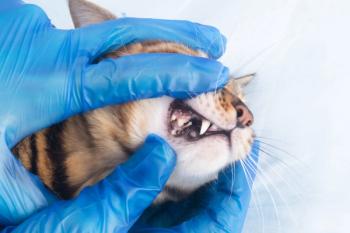
- dvm360 December 2019
- Volume 50
- Issue 12
Cats bond just as strongly to their owners as dogs do, study indicates
New research on feline attachment behavior shows that cats bond with their caregiversyour veterinary clientsjust as much as babies and dogs do.
Cats are often described as aloof, ambivalent and antisocial, but researchers at Oregon State University's Human-Animal Interaction Lab beg to differ. Results of their new study, published in
In their study summary, the authors contend that “despite fewer studies, research suggests we may be underestimating cats' socio-cognitive abilities.”
Using behavioral criteria applied in the
Investigators observed the cats' attachment level during this final stage-the owner's return-and categorized it either as secure, in which the cat continued to explore the room calmly when the owner returned, or insecure, with the cat demonstrating anxiety when the owner returned. This anxiety was manifested by avoiding the caregiver, acting ambivalent toward the caregiver, or a combination of the two.
The origins of attachment theory
Psychoanalyst John Bowlby's attachment theory states that children are born biologically preprogrammed to form attachments with others because this helps them survive. A child is considered securely attached to a parent if the child feels confident in their caregiver's support and unafraid to explore the world around them.
To assess attachment, developmental psychologist Mary Ainsworth developed the “
Of the 70 classifiable kittens (nine were considered unclassifiable), 64.3% were categorized as securely attached and 35.7% as insecurely attached. Similarly, 65.8% of the adult cats were classified as having a secure attachment and 34.2% an insecure attachment. These findings are well in line with those in canine and human studies, the investigators noted-
The investigators retested about half of the kittens after six weeks of training and socialization, and found that those activities had no measurable effect on attachment level.
This study's findings demonstrate that, like dogs, the majority of cats view their owners as a source of comfort and security. Lead study investigator Kristyn Vitale, PhD, told dvm360 that she was not surprised by the findings.
“We see in other species, such as dogs and human infants, that the majority of individuals are securely attached to their caregiver, so it is not shocking the same is true in cats,” Dr. Vitale says.
And the findings are useful for both cat owners and veterinary practices, she says.
“The formation of strong bonds between cats and humans can have positive impact on cat behavior and welfare,” Dr. Vitale says. “The more we know about the cat-human bond, the more strategies we can propose to deal with feline behavioral issues in the home or address medical issues related to separation distress.”
Articles in this issue
about 6 years ago
FDA approves longer-lasting feline preventiveabout 6 years ago
Speaking their languageabout 6 years ago
Just approved: Generic clomipramine for canine separation anxietyabout 6 years ago
Talk about birthing pains!about 6 years ago
Economic trends in veterinary medicineabout 6 years ago
How cannabidiol is changing the pet treat industryabout 6 years ago
AAFP releases new feline zoonosis guidelinesNewsletter
From exam room tips to practice management insights, get trusted veterinary news delivered straight to your inbox—subscribe to dvm360.






